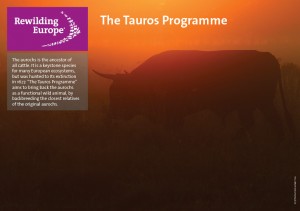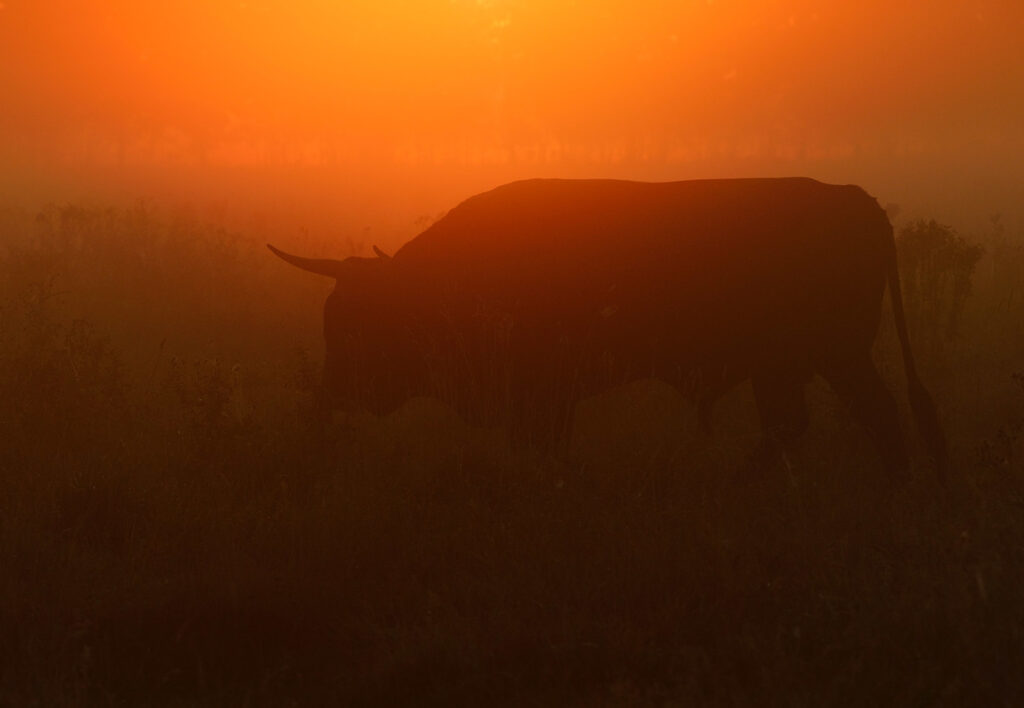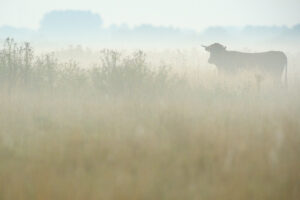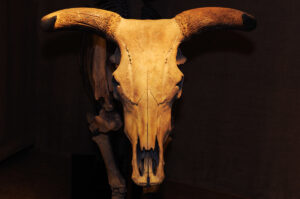Tauros Programme
The aurochs is the ancestor of all cattle and thereby the most important animal in the history of mankind. It is also a keystone species for many European ecosystems, but was hunted to its extinction in 1627. However, its DNA is still alive, but distributed among a number of the ancient original cattle breeds. "The Tauros Programme" aims to bring back the aurochs as a functional wild animal, by back-breeding the closest relatives of the original aurochs.The aurochs was one of Europe's most important mammal species. It was the continent's heaviest land mammal, after the woolly rhinoceros and woolly mammoth, with bulls weighing in excess of 1,000 kilos.
In the Greek myth about the founding of Europe, Zeus in the form of an aurochs bull seduces and kidnaps the beautiful princess Europa. Since then the aurochs and its descendants – our present day cattle breeds – have played an important role in the making of Europe. Zeus the bull and Europa can today be found on the Greek two Euro coin. The building of the Council of Europe in Brussels has chosen the same symbol: a statue of Europa and the bull.
The aurochs once roved virtually all across Europe: from the southern part of Scandinavia to North Africa, from the UK all the way into Central Asia. The ecological influence of all these grazing animals on the vegetation was significant. After the last Ice age, however, things started to change because of modern man.
The aurochs stood almost 180 cm tall and due to its long legs and slender build was an agile animal. Its long, thick horns, speed and bulk weight provided powerful means of defense, and adult aurochs could give large predators such as wolves a serious match. The cows were considerably smaller than the bulls and chestnut brown in colour. Calves were born chestnut-coloured, with bull calves changing coat colour after a few months for a very deep brown or black, with a whitish eel stripe running down the spine. Typical for both sexes was the lightly coloured mouth part.
The aurochs was an impressive animal, perfectly adapted to the diversity of landscapes it inhabited, ranging from open steppes and semi-deserts to more savannah-like landscapes, marshlands, several kinds of forest and mountains far above the timberline. Thus it seems to have lived in most habitats encountered in Europe except in the boreal forest zones – pretty much as domestic cattle do today.
The only real reason why the aurochs disappeared was because man hunted it to extinction. First for meat, but when man later brought in domestic cattle, it was also an intentional extermination because of grazing competition from the aurochs. The last aurochs individual died in Jaktorów in Poland 1627.
For hundreds of thousands of years Europe's ecosystems benefited from and were shaped by the strong influence from wild and free living herds of aurochs, together with other large herbivores like European bison, wild horses, deer and ibex. During the last four-five thousand years a somewhat similar grazing impact was continued through the vast herds of domesticated livestock that totally dominated most landscapes. But today, after all these millennia of uninterrupted grazing, vast parts of Europe are facing pasture and farmland abandonment at a scale never experienced before.
A wilder Europe really needs herds of fully self-sufficient, wild bovines to prevent further loss of the biodiversity of the open areas. This is why the "Tauros Programme" was started by the Taurus Foundation, with the goal to bring back the closest possible stand-in for the extinct aurochs as a wild animal. Rewilding Europe has joined forces with the Taurus Foundation in these efforts. The Tauros – as the animal will initially be called – will resemble the aurochs as closely as technically possible in appearance, ecology, behavior and genetics.
The breeding programme is founded on a broad, multidisciplinary scientific base, including geneticists, ecologists, molecular biologists, archaeologists, archaeo-zoologists, historians, isotope experts, cattle experts and European cattle breeding organizations.
The final goal of the programme, to be met in some 20 years, is the presence of the Tauros as a self-sufficient wild bovine grazer in herds of at least 150 animals each in several rewilding areas in Europe.
Fact sheet
Download the Tauros programme fact sheet here:




